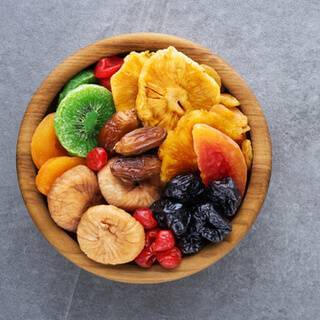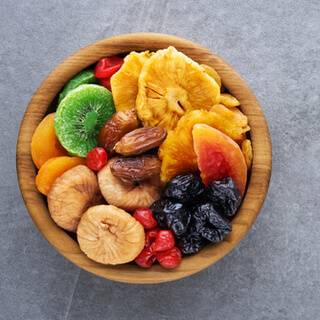During the holy month of Ramadan, according to doctors and nutrition experts, consuming dried fruits helps provide the body with natural sugars that are converted into energy, in addition to replenishing the fluids lost during the long hours of fasting. However, it is important to consume them in moderation and not to overindulge. Dried fruits are simply natural fruits that have undergone drying processes, resulting in the removal of their water content, causing them to shrink and become small yet energy-packed. There are many different types of dried fruits, and among the most popular varieties, especially during Ramadan, are raisins, dates, prunes, figs, and apricots.
The advantage of dried fruits over fresh fruits is that they can be stored for long periods and can be taken as a snack while traveling long distances without needing refrigeration. They contain complex and simple carbohydrates, fiber, vitamins, and antioxidants, and they also provide the body with essential nutrients needed during fasting hours. Additionally, dried fruits help improve various issues, including enhancing mood, promoting youthful skin, improving digestion, and importantly, they assist individuals suffering from anxiety and depression.
Among the most famous dried fruits are:
- **Dates**: They are a high source of iron and rich in sugar; they help treat constipation due to their high fiber content, alleviate dizziness and headaches, provide body balance, energize, and refresh the body.
- **Apricots**: They contribute to improving vision due to their richness in vitamins "A" and "E," strengthen the immune system as they are rich in antioxidants, and improve digestive processes, reducing the risk of constipation. They also nourish the skin and maintain bone health.
- **Raisins**: They assist in digestion due to their fiber content and enhance nerve function because they are rich in vitamin "B." They also strengthen bones as they contain several minerals like potassium, calcium, and phosphorus.
- **Figs**: They prevent constipation because of their high fiber content, help maintain blood sugar levels due to their potassium content, and lower cholesterol levels due to their fiber richness.
- **Prunes**: They contain many important vitamins and minerals for health and help treat and prevent constipation due to their high levels of dietary fiber. Dried prunes also contain a type of sugar known as sorbitol, which acts as a natural laxative. However, it is crucial not to overconsume them, as it may lead to diarrhea. Dried prunes are high in vitamin "K" and other compounds that act as antioxidants, which help protect bones from losing their density. They also enhance digestive health and are rich in antioxidants that help combat and neutralize harmful free radicals in the body.




